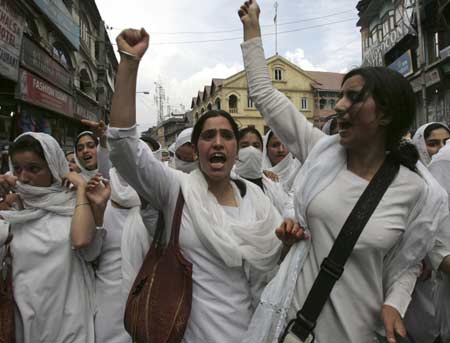European Parliament passes Urgent Resolution on execution of Afzal Guru
Brussels/Strasbourg: In a major setback to India at international level European Parliament today passed the Urgent Resolution on the execution of Afzal Guru by voting unanimously for the motion.
ICHR has, with its intense lobbying, persuaded various political groups and considerable number of Members of the European Parliament to introduce a motion for an Urgency Resolution on the secret hanging of Afzal Guru. The proposed motion was discussed and unanimously voted in the European Parliament’s plenary session today at Strasbourg.
Strasbourg is the capital and principal city of the Alsace region in eastern France and is the official seat of the European Parliament. Located close to the border with Germany
Barrister Tramboo head of ICHR termed this step as positive measure for human rights defenders and hoped that it will inspire further action from European leaders on the state of affairs in Indian Held Kashmir.
Barrister Tramboo commended Mr. Ali Shah Nawaz Khan, Executive Director of Kashmiri Scandinavian Council who contributed to bring about the Afzal Guru Urgency Resolution in European Parliament.
Final Text of the resolution adopted unanimously by voting for the motion at European Parliament at Strasbourg (France).
European Parliament resolution on India: execution of Mohammad Afzal Guru and its implications (2013/2640(RSP)) �
� � �
The European Parliament,
– � having regard to UN General Assembly Resolution 62/149 of 18 December 2007 calling for a moratorium on the use of the death penalty, and UN General Assembly Resolution 63/168 calling for the implementation of General Assembly Resolution 62/149, adopted by the UN General Assembly on 18 December 2008,
– � having regard to the final declaration adopted by the 4th World Congress Against the Death Penalty, held in Geneva from 24 to 26 February 2010, which calls for universal abolition of the death penalty,
– � having regard to the UN Secretary-General’s report of 11 August 2010 on moratoriums on the use of the death penalty,
– � having regard to its previous resolutions on the abolition of the death penalty, and in particular that of 26 April 2007 on the initiative for an immediate moratorium on the death penalty(1),
– � having regard to the submission made in July 2012 by 14 retired Indian Supreme Court and High Court judges to the President of India calling on him to commute the death sentences of 13 prisoners on the grounds that those sentences had been erroneously upheld by the Supreme Court over the previous nine years,
– � having regard to the World Day against the Death Penalty and to the European Day against the Death Penalty held on 10 October every year,
– � having regard to Rules 122(5) and 110(4) of its Rules of Procedure,
A. whereas Mohammad Afzal Guru was sentenced to death in 2002 after being convicted of conspiracy in relation to the December 2001 attack on the Parliament of India, and was executed by the Indian authorities on 9 February 2013;
B. �whereas the death penalty is the ultimate cruel, inhuman and degrading punishment, violating the right to life as enshrined in the Universal Declaration of Human Rights;
C. whereas 154 countries in the world have abolished the death penalty de jure or de facto; whereas India, when presenting its candidacy for a seat on the UN Human Rights Council ahead of the elections of 20 May 2011, pledged to uphold the highest standards of promotion and protection of human rights;
D. whereas India ended its eight-year unofficial moratorium on executions in November 2012, when it executed Ajmal Kasab, convicted for his role in the 2008 Mumbai attacks;
E. �whereas national and international human rights organisations have raised serious questions about the fairness of Afzal Guru’s trial;
F. �whereas over 1 455 prisoners in India are currently on death row;
G. whereas, despite a curfew imposed in large parts of Indian-administered Kashmir, Afzal Guru’s death was followed by protests;
1. �Reiterates its long-standing opposition to the death penalty under all circumstances, and calls once again for an immediate moratorium on executions in those countries where the death penalty is still applied;
2. �Condemns the Government of India’s execution in secret of Afzal Guru at New Delhi’s Tihar Jail on 9 February 2013, in opposition to the worldwide trend towards the abolition of capital punishment, and expresses its regret that Afzal Guru’s wife and other family members were not informed of his imminent execution and burial;
3. �Calls on the Government of India to return Afzal Guru’s body to his family;
4. �Urges the Indian authorities to maintain adherence to the highest national and international judicial standards in all trials and judicial proceedings, and to provide the necessary legal assistance to all prisoners and persons facing trial;
5. �Regrets the deaths of three young Kashmiris following the protests against Afzal Guru’s execution; calls on the security forces to exercise restraint in the use of force against peaceful protesters;
6. �Calls on the Government of India, as a matter of urgency, not to approve any execution order in the future;
7. �Calls on the Government and Parliament of India to adopt legislation introducing a permanent moratorium on executions, with the objective of abolishing the death penalty in the near future;
8. �Instructs its President to forward this resolution to the Vice-President / High Representative, the Council, the Commission, the governments and parliaments of the Member States, the Commonwealth Secretary-General, the UN Secretary-General, the President of the UN General Assembly, the UN High Commissioner for Human Rights, and the President, Government and Parliament of India.
Related articles
- CPI(M) demands abolition of #deathpenalty (kractivist.wordpress.com)
- Justice A P Shah – “One hardly finds a rich or affluent person going to the gallows” #deathpenalty (kractivist.wordpress.com)
- CRPP Statement of on Death Sentence to Bhullar (kractivist.wordpress.com)
- Mohd Afzal Guru A life rendered ‘extinct’ (kractivist.wordpress.com)










